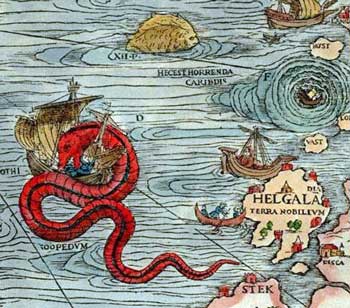

- This event has passed.
Approaching the Unknown: “They Saw It With Their Own Eyes”

A Conference Organized by the UCLA Mellon Program in Post-Classical Latin
| The starting point for this conference is the statement “they saw it with their own eyes”: this phrase appears frequently on Fra Mauro’s fifteenth-century map of the world, a landmark in cartography because of Mauro’s decision to use the most recent eyewitness testimony rather than exclusively patristic and ancient sources. In his inscriptions on the map which describe in vivid detail his reasoning for certain depictions, Mauro often repeats the phrase in support of his daring claims about the distant lands of which he had no personal, first-hand knowledge.
Relying on those who “saw it with their own eyes” is one way of approaching the unknown. This conference will explore the diverse range of ways in which writers and thinkers from the medieval and early modern periods sought to face the challenge of the unknown: the scholarly, intellectual and literary processes by which they evaluated, diagrammatised and represented what lay beyond their own line of sight. The epistemological challenge of describing and understanding places and ideas beyond the horizon of first-hand knowledge is tackled in a wide variety of texts and contexts. Travel narratives aim to represent the far-flung corners of the earth. Religious texts explore the limits of human existence and experience. Literary texts offer another range of strategies for making the unfamiliar familiar. Furthermore, like Mauro’s map, the sixteenth-century Carta Marina produced by Olaus Magnus is a landmark in cartographical accuracy, and yet nevertheless its seas are populated by monsters (as in the image below). The mythical imagination thus offers another cultural approach to representing the unseen. These various texts offer a variety of strategies which may support or contest the epistemological claims behind Mauro’s statement: “they saw it with their own eyes”. Organized by the Mellon post-baccalaureate students in post-classical Latin: Matthew Aiello, Lillian Datchev, Kai Dowding, Timothy Glover, Christa Lundberg ,Kate Perl; and Professor Robert Gurval Department of Classics. Co-sponsored by the UCLA Center for Medieval & Renaissance Studies and the UCLA Department of Classics with generous support from the Andrew W. Mellon Foundation. Advance registration not required. No fee. Limited seating. |
|
| Thursday, April 13 Humanities Conference Room, Royce Hall Room 314 |
|
| 4:30 | Refreshments |
| 5:00 | Keynote Lecture: Anthony Pagden (UCLA) “Plus Ultra: Changing European Images of Time and Space” |
| Friday, April 14 Humanities Conference Room, Royce Hall Room 314 |
|
| 8:30 | Registration, Coffee, Pastries |
| 9:00 | Opening Remarks |
| Panel 1: Mapping | |
| 9:15 | Richard Calis (Princeton University) “Trust and Credibility in Early Modern Ethnography: Martin Crusius and Ottoman Greece” |
| 9:35 | Miranda Elston (University of North Carolina-Chapel Hill) “Cultural Knowledge through the Architectural Landscape: Utopia and the Mapping of Culture” |
| 9:55 | Anna Venturini (Warburg Institute) “Approaching the Inner Unknown: Hand-Mapping in 17th-Century France” |
| 10:15 | Discussion |
| 10:45 | Break |
| Panel 2: Exerting Empire | |
| 11:00 | Alex Haskins (University of Chicago) “‘The Spirit of Erasure’—Asian Despotism in Montesquieu’s Spirit of the Laws” |
| 11:20 | Robert Iafolla (UCLA) “Heralding the Unknown: Coats of Arms in Early Spanish America” |
| 11:40 | Discussion |
| 12:00 | Lunch Break |
| Panel 3: Telling | |
| 1:30 | Kersti Francis (UCLA) “From Babel to Wonder: Multilingualism as Marvel in Marco Polo’s Le Devisement du Monde“ |
| 1:50 | Nathan Kish (UCLA) “Novum genus disciplinae: Novelty and Alterity in Roman Oratorical Criticism” |
| 2:10 | Cristina Politano (UCLA) “Holy Aphasia: On the Ineffability of God in Bendeit’s Voyage de Saint Brendan“ |
| 2:30 | Discussion |
| 3:00 | Break |
| Panel 4: Imagining | |
| 3:15 | Anya Josephs (UCLA) “Staging the Unknown: Eyewitness and the Early Modern Stage” |
| 3:35 | Erika Mandarino (Tulane University) “‘How can I solve this doubt without going up there?’: Cyrano de Bergerac’s Adventures in the Heavens” |
| 3:55 | Florencia Pierri (Princeton University) “The Rehabilitation of the Unicorn: The Tension Between Myth and Reality in Early Modern Europe” |
| 4:15 | Discussion |
| Inquiries? Please contact Kai Dowding (kaidowding@gmail.com) or Robert Gurval (gurval@humnet.ucla.edu) | |
